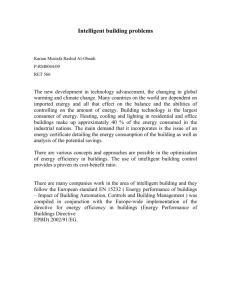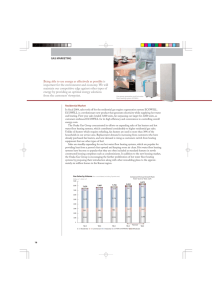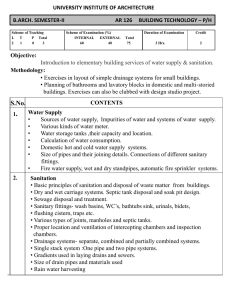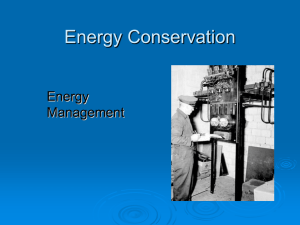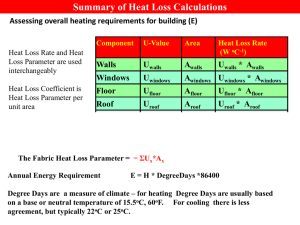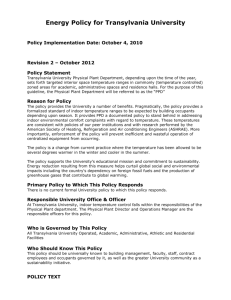Energy Management Plan - Shelby County Public Schools
advertisement
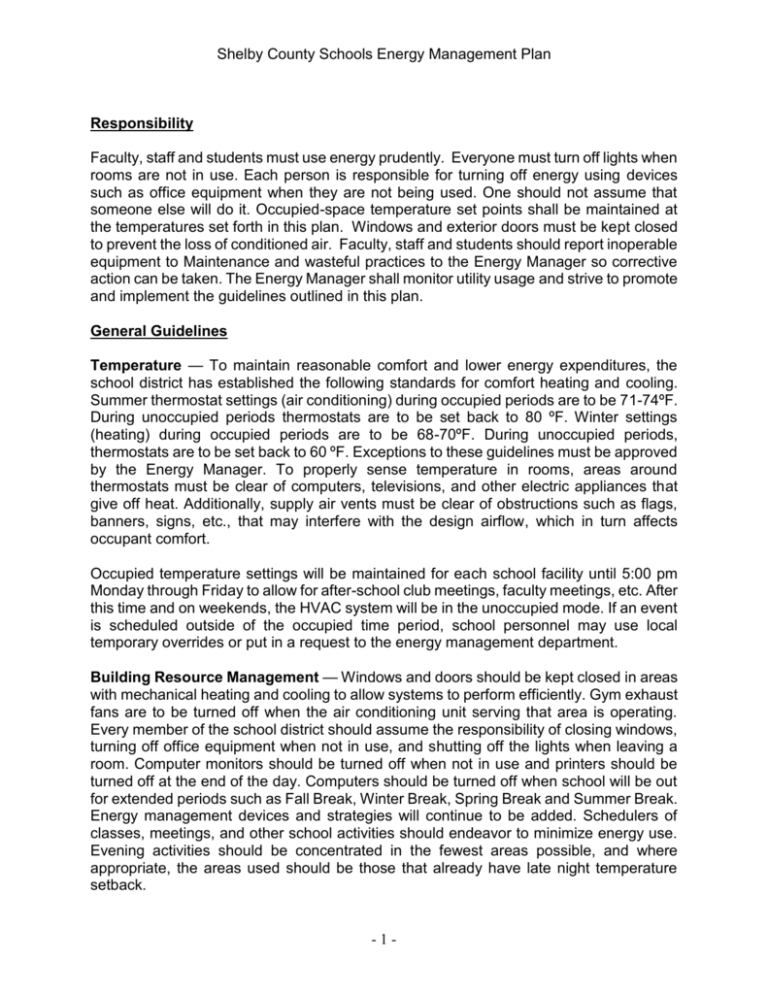
Shelby County Schools Energy Management Plan Responsibility Faculty, staff and students must use energy prudently. Everyone must turn off lights when rooms are not in use. Each person is responsible for turning off energy using devices such as office equipment when they are not being used. One should not assume that someone else will do it. Occupied-space temperature set points shall be maintained at the temperatures set forth in this plan. Windows and exterior doors must be kept closed to prevent the loss of conditioned air. Faculty, staff and students should report inoperable equipment to Maintenance and wasteful practices to the Energy Manager so corrective action can be taken. The Energy Manager shall monitor utility usage and strive to promote and implement the guidelines outlined in this plan. General Guidelines Temperature — To maintain reasonable comfort and lower energy expenditures, the school district has established the following standards for comfort heating and cooling. Summer thermostat settings (air conditioning) during occupied periods are to be 71-74ºF. During unoccupied periods thermostats are to be set back to 80 ºF. Winter settings (heating) during occupied periods are to be 68-70ºF. During unoccupied periods, thermostats are to be set back to 60 ºF. Exceptions to these guidelines must be approved by the Energy Manager. To properly sense temperature in rooms, areas around thermostats must be clear of computers, televisions, and other electric appliances that give off heat. Additionally, supply air vents must be clear of obstructions such as flags, banners, signs, etc., that may interfere with the design airflow, which in turn affects occupant comfort. Occupied temperature settings will be maintained for each school facility until 5:00 pm Monday through Friday to allow for after-school club meetings, faculty meetings, etc. After this time and on weekends, the HVAC system will be in the unoccupied mode. If an event is scheduled outside of the occupied time period, school personnel may use local temporary overrides or put in a request to the energy management department. Building Resource Management — Windows and doors should be kept closed in areas with mechanical heating and cooling to allow systems to perform efficiently. Gym exhaust fans are to be turned off when the air conditioning unit serving that area is operating. Every member of the school district should assume the responsibility of closing windows, turning off office equipment when not in use, and shutting off the lights when leaving a room. Computer monitors should be turned off when not in use and printers should be turned off at the end of the day. Computers should be turned off when school will be out for extended periods such as Fall Break, Winter Break, Spring Break and Summer Break. Energy management devices and strategies will continue to be added. Schedulers of classes, meetings, and other school activities should endeavor to minimize energy use. Evening activities should be concentrated in the fewest areas possible, and where appropriate, the areas used should be those that already have late night temperature setback. -1- Shelby County Schools Energy Management Plan Lighting — Interior lighting shall be fluorescent, whenever possible. New energy-saving fixtures, lamps and ballasts will be used to replace existing less efficient lighting whenever economically feasible and appropriate. Exterior lighting will be high-pressure sodium or metal halide (metal halide is preferred) whenever possible, and will meet minimum current safety requirements. Decorative lighting (construction) shall be kept to a minimum. Lighting levels recommended by the most recent edition of the IES (Illuminating Engineering Society) Lighting Handbook shall be used as guidelines. Where it makes economic sense, occupancy/motion sensors (ultrasonic or infrared) wired to area lighting will be installed to reduce and/or turn off lights in unoccupied, vacated areas. Day-lighting controls will be installed, if economically feasible, to automatically adjust lighting levels as appropriate. Task lighting, such as desk lamps, is recommended to reduce overall ambient lighting levels. Teachers are encouraged to use task lighting at the end of the day after the students have left instead of the overhead fluorescent lighting. Compact fluorescent bulbs should be used in desk lamps. These are now readily available at local stores. Space Heaters — Whether they are purchased by the school district or personal property, two issues affect the use of space heaters in buildings — fire safety and energy efficiency. All space heaters used must be approved for fire safety, as classified by the National Fire Protection Association. No liquid fueled space heaters (e.g., kerosene heaters) shall be used in any office or classroom. Some electric space heaters also pose an unacceptable fire hazard. All space heaters must meet the following four specifications: Heaters must (1) be UL approved, (2) have elements that are protected from contact, (3) be tilt-proof (when tipped over, heater goes off), and (4) be thermostatcontrolled. Space heaters must be unplugged when not in use. The issue of energy efficiency is also important — electric space heaters are a very costly means of heating. If a member of the school district feels that a space heater is necessary for adequate warmth, this may indicate that the central heating system needs repair. Maintenance should be consulted if the central heating system is incapable of meeting comfort requirements. Maintenance should also be contacted if a space heater is to be used to offset excessive air conditioning. Excessive cooling of a space below the summertime Temperature Guidelines should be reported to Maintenance so that air-conditioning levels can be adjusted. Switchover from Heating to Cooling — Maintenance personnel perform required changeover from heating to air-conditioning in the spring. Because of the varying equipment installed throughout the district, buildings must be changed over individually. Maintenance performs the changeover on the basis of priorities established to (1) provide comfort to students, (2) maintain required temperatures to protect equipment, and (3) serve the greatest number of individuals and activities. Air conditioning may not begin until outside temperature has reached 75ºF for three consecutive days. Temperature projections are also considered. The wide swings in temperature during the spring of the year and the difficulty in switching between heating and cooling make this policy necessary. Special problems or hardships with this policy should be addressed to the Director of Buildings and Grounds. -2- Shelby County Schools Energy Management Plan Switchover from Cooling to Heating — Maintenance personnel perform required changeover from air-conditioning to heating in the fall. Because of the varying equipment installed throughout the district, buildings must be changed over individually. Facilities performs the changeover on the basis of priorities established to (1) provide comfort to students, (2) maintain required temperatures to protect equipment, and (3) serve the greatest number of individuals and activities. Heating may not begin until the high outside air temperature has dropped below at least 55ºF for three consecutive days. Temperature projections are also considered. The wide swings in temperature during the fall of the year have made this policy necessary. Special problems or hardships with this policy should be addressed to the Director of Buildings and Grounds. Filters – Filters shall be changed within one week of delivery. The person responsible for filter changes shall submit a quarterly filter log to their principal/supervisor who will sign and forward to the Maintenance Department. Holiday Periods — A period of closure for the school district offers a great opportunity to save money on utilities that can be spent in other areas. Past history has shown that very few people occupy the buildings for any substantial time during the holidays. With this in mind, buildings shall be only minimally heated/cooled during holiday periods. The exception to the policy will be buildings or areas that contain special collections or sensitive equipment, or buildings that are officially open during the holidays. Requests for exceptions to this policy with justification should be addressed to the Director of Buildings and Grounds after curtailment plans for the upcoming holiday period have been issued. New Construction — The school district shall seek to reduce future energy costs in new facility construction and renovation whenever feasible. Current standards outlined in ASHRAE Standard No. 90.1 Energy Efficient Design of New Buildings Except Low Rise Residential Buildings shall be followed as closely as possible. Additionally, all city and state regulations shall be followed. All planning for major construction and equipment purchase/installation must include energy life cycle costing. New equipment purchased must carry the ENERGY STAR label as often as practical. As resources become available, Shelby County Schools shall develop and implement design standards for new construction to include energy efficiency. Water Conservation — Shelby County Schools are committed to promoting the conservation of water in addition to energy. Faculty, staff, and students should report malfunctioning water faucets, toilets and urinals to Maintenance so corrective action can be taken. Faculty and staff shall educate students on the importance of turning off water after using restroom facilities. The school district shall seek to implement methods of capturing rainwater for use in non-potable applications and shall use native plantings where possible to reduce the amount of watering needed. -3-
